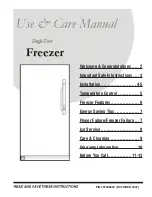
9
GB
Using your freezer
Freezing
- Remember that you should never re-freeze products you
have allowed to thaw, even if only partially: cook the food,
then either eat (within 24 hours) or re-freeze it.
- In order to freeze fresh foods, the switch must be turned
to the left (the yellow light will come on). Then introduce
the food to be frozen into the top compartment, placing
them - to the furthest extent possible - in direct contact
with the cooling plate and away from any frozen food being
stored.
Proper freezing depends on the speed at which food is fro-
zen. For this reason, we recommend that the switch be
turned to the freeze setting (the yellow light will come on)
24 hours before the food to be frozen is placed in the
freezer. This operation is necessary for large quanti-
ties of food (up to the maximum capacity indicated on
the data plate).
- Do not open the freezer door during freezing.
- If a large amount of food is introduced for freezing at one
time, the freezer temperature may momentarily increase
inside the compartment (red light on). Since this is just a
transient situation, the foods already stored in the freezer
will not be harmed.
- After 24 hours have passed and the food has been frozen,
turn the freezer switch back to the normal setting (the yel-
low light will turn off).
Important:
.Remember to carry out this last step in order
to save energy.
- For the best conservation and defrosting, remember to
freeze small portions; this will ensure rapid and uniform
freezing. Mark the freezing date and description of the
contents on the package, as shown in the table.
- In the case of power failure or breakdown, do not open
the freezer door. This will help maintain the temperature
inside the freezer ensuring that foods are conserved for at
least 9-14 hours.
- Do not store full bottles in the freezer since they could
explode when they freeze. (Remember that liquids increase
in volume when frozen).
- Fill the ice trays so that they are no more than 3/4 full.
Preservation of Foodstuffs
To preserve frozen and deep-frozen foods well, never set
the thermostat below 1, no matter what the room tempe-
rature is.
For room temperatures from 25°C to 27°C the knob should
be set between 1 and 2 while for room temperatures of up
to 32°C, set between 2 and 3.
The maximum storage times for frozen foods are indicated
in the tables “Guide for using the freezer.
Always follow the instructions on the packages of deep
frozen foods carefully and if there are no instructions
neverkeep the food for more than 3 months from the date
of purchase.
When buying deep-frozen foods, ensure that they have been
stored at appropriate temperatures and that the wrapping
is intact.
To keep the quality of the deep-frozen food unlatered,
transfer it to special containers and then place it inside the
storage compartment as soon as possible.
If a packing shows signs of moisture and abnormal swelling,
it has probably been stored at the wrong temperature and
the contents have been spoiled.
Fig. 1
Caring for your appliance
Before doing any cleaning, disconnect the appliance
from the electricity (by pulling out the plug orturning
off the general switch in your home).
Defrosting
WARNING: do not damage the refrigeration circuit.
The frost should be removed from the walls of the appliance
periodically.
Never use sharp metal objects to remove frost because they
could pierce the cooling circuit and damage the freezer
beyong repair.
Use the plastic scraper provided for this purpose.
To defrost the appliance completely (this should be done
once or twice a year), turn off the green light and leave the
door open until the frost has completely thawed.
A defrost water collection system is situated at the bottom
of this appliance as shown in figire 1.
To speed up defrosting, place one or more basins of warm
water inside the appliance.
When defrosting, remove the frozen food from the
appliance, wrap it in newspaper and store in a cool place.
Since the rise in temperature will shorten the storage life of
the food, it should be used as soon as possible.












































